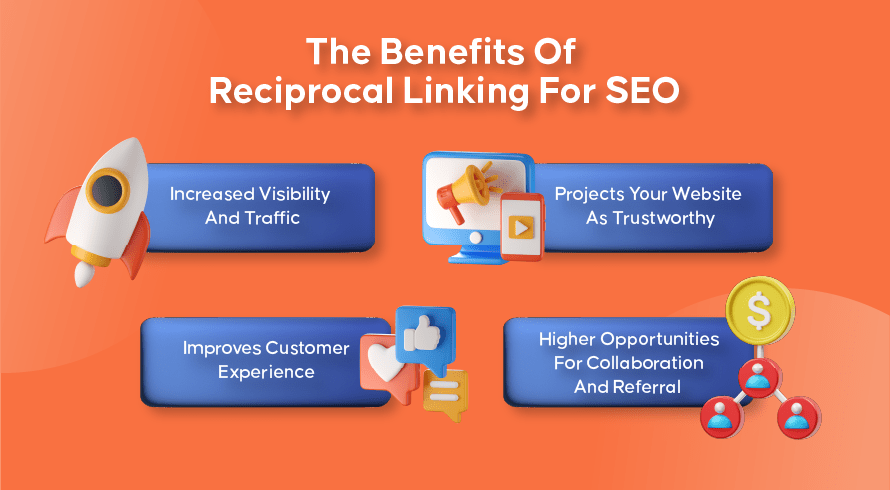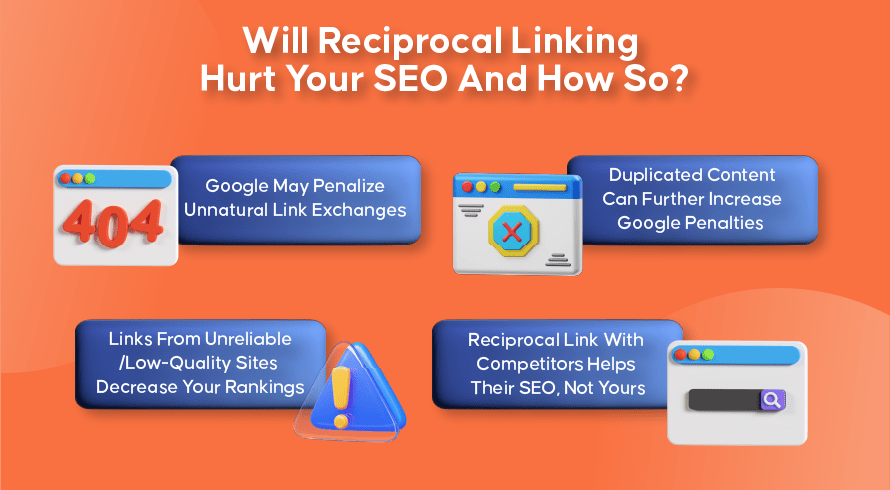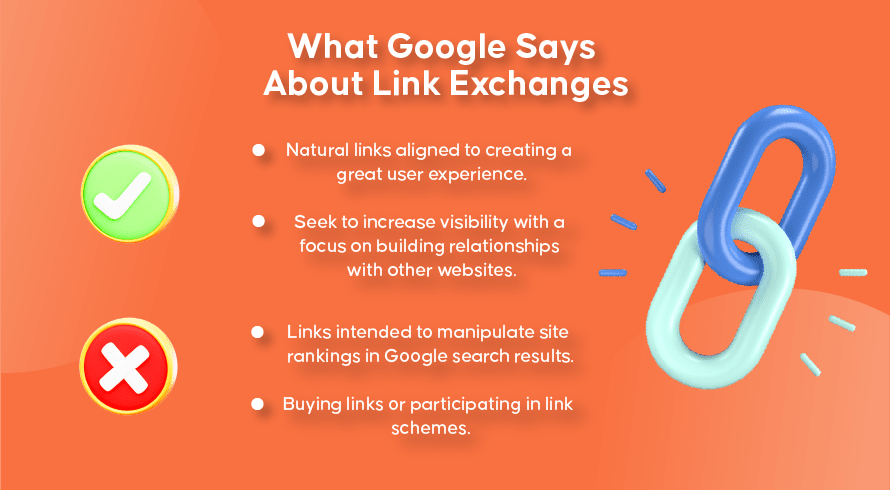Inquivix HQ
1-903, 18 Eonju-ro 146-gil,
Gangnam-gu, Seoul, Korea
06057

Getting higher rankings in search engine results pages (SERPs) is a major goal of SEO. Many SEO professionals swear by the effectiveness of reciprocal linking – providing links to other websites and receiving those same links back – as an effective way to develop your website’s online presence and gain better organic visibility. But does it really work? Does it help you rank better or the exact opposite?
In this blog post, we’ll dive into the nitty gritty details of whether or not reciprocal link building is a good practice for SEO purposes. We’ll discuss why some people are advocates for utilizing this strategy as well as why others don’t believe in its efficacy to give you an informed understanding of current thought processes when it comes to boosting SERP results through reciprocal linking techniques.
What Is Reciprocal Linking?

Reciprocal linking, simply known as “link exchange”, is an SEO tactic used to increase the ranking of a website in search engines by exchanging backlinks. It involves creating mutual links between two websites, so when visitors explore one, they can also access the other. It is important to choose appropriate partners for reciprocal linking, as it has great benefits for both parties involved.
While you might think reciprocal linking is a foolproof method to gain quality backlinks and boost your website’s visibility on search engine result pages- there’s a catch. Search engines only value mutually exchanged links highly and reward them with higher rankings on their search engine result pages provided that these links are actually relevant. Reciprocal links must be authentic rather than “forced”, and if it is perceived to provide no value for visitors and simply a method of building links, it can do more harm than good for both your own site and the linking site.
Below we have outlined the benefits of reciprocal links, after which we list the potential harms they may cause if done incorrectly. Keep reading to learn more.
The Benefits Of Reciprocal Linking For SEO

If done correctly, this link-building SEO technique between websites can provide a myriad of advantages from increasing visibility and website traffic to improving customer experience, showcasing your website as trustworthy, and opening up opportunities for collaboration and referral. Let’s dive further into these benefits right below.
Increased Visibility And Traffic
The most obvious benefit of reciprocal linking is increased visibility. When websites link to each other, they create a spiderweb of connections that allow users to easily find related content. This helps your website gain traction with search engines like Google and Bing, which can lead to higher rankings and more organic traffic. Not only will this boost your visibility online, but it will also help attract more visitors to your website.
Improves Customer Experience
Reciprocal linking also improves the customer experience. By providing links to other relevant websites, you are giving customers access to information that they may not have been able to find on their own. This makes it easier for them to find what they need in one place without having to hunt around for it on different sites.
This not only makes it easier for customers to find what they need but also gives them access to different perspectives on the same topic from various sources, thus enhancing their overall experience with your brand. Plus, if customers trust the quality of the information that you are linking out to, this will increase engagement levels which will reflect positively on your website as well, especially to search engines thereby raising the opportunity to increase search engine rankings.
Projects Your Website As Trustworthy
By engaging in reciprocal linking, you are showing search engines that your website is trustworthy and reliable—which can be a big boost for SEO rankings! After all, if you have established relationships with other reputable websites then this indicates that your site is credible too. Furthermore, when other sites link back to yours it shows that they value what you have to say—which can go a long way toward building trust with potential customers.
Higher Opportunities For Collaboration And Referral
Finally, reciprocal linking opens up opportunities for collaboration and referral between different websites. You can collaborate with other sites by offering guest posts or blog swaps; these types of activities can help generate more buzz about both websites and drive even more traffic in the long run! Additionally, if another site links out to yours then this could potentially lead to additional referrals from those users who click through from their website onto yours—so it’s definitely worth exploring these possibilities!
Will Reciprocal Linking Hurt Your SEO And How So?

Your website may experience more damage than good if your reciprocal linking methods are not authentic and relevant to website visitors. We will discuss the potential dangers of using reciprocal links on your website in order to help you make an informed decision about whether or not to use them. Although reciprocal links are not part of black hat link-building, they can be disastrous if implemented without caution.
Google May Penalize Unnatural Link Exchanges
Google takes into account the type of links that point to your website when determining its ranking. Google frowns upon unnatural link exchanges and may penalize websites for engaging in them. This means that if you’re exchanging links with another website solely for the purpose of boosting your own rank or taking part in excessive reciprocal linking, Google may punish your site by lowering its rank or removing it from the index altogether. Any practice to manipulate search results will definitely come to light so it is crucial that you stay away from such practices.
When engaging in link exchanges, be sure to only do it with partner pages whose content is relevant to yours and that offer high-quality content while adhering to Google’s webmaster guidelines. Bad link removal may impact your search rankings, so it is better to ensure that you don’t have links that could be penalized in the first place. This exchange of incoming and outgoing links must be done with caution, with careful consideration of reciprocal link requests from other sites.
Links From Unreliable/Low-Quality Sites Decrease Your Rankings
When exchanging links with another website, make sure that the other site is reliable and has a good reputation. Otherwise, you may find yourself receiving low-quality links from spammy sites or link farms — which can result in decreased rankings due to lower PageRank scores or being marked as “untrusted” by search engine algorithms.
It’s important to do your research before linking with any other site! This goes for even having a resource page stacked with reciprocal link exchanges, as the quality of the linking site can have severe consequences on your website’s appearance on search results.
Duplicated Content Can Further Increase Google Penalties
If you’re exchanging content with another website in addition to exchanging links, make sure that the content is unique and not duplicated across multiple sites. Duplicate content will not only hurt your SEO score but also put you at risk of further penalties from Google’s algorithms if they determine that it is violating their guidelines for site owners. Additionally, be aware of any automated tools or scripts used for linking; these are often seen as suspicious by search engines and can lead to penalties if detected.
Reciprocal Link With Competitors Helps Their SEO, Not Yours
Not only does reciprocal linking come with potential risks for your own website but it also provides benefits for your competitors — not for yourself! As such, think twice before engaging in reciprocal linking campaigns with your business rivals; instead, focus on building organic backlinks from high-quality websites through strong content marketing strategies like guest blogging or influencer outreach campaigns or allowing naturally occurring reciprocal links instead of forcing it.
What Does Google Say About Link Exchange?

Google has a pretty straightforward stance on link exchanges, also known as reciprocal link-building. They strongly prefer tactics that are natural and aligned to creating a great user experience. That means they recommend businesses seeking to increase their visibility focus on building relationships with other websites and avoid buying links or participating in link schemes that could be perceived as manipulation.
Additionally, Google’s Webmaster Guidelines state that any links intended to manipulate a site’s ranking in Google search results should be avoided entirely. Link exchanges create an artificial connection between two sites for marketing purposes only, which is something Google does not recommend when it comes to improving rankings. This does not mean reciprocal links are fully ineffective though – when two sites both benefit from increased online visibility through a mutual link agreement, SEO success can be seen over time with the right approach.
Use Reciprocal Link Building Wisely
Link building has been a part of SEO since the beginning, and reciprocal linking is one method that some webmasters have used to increase their link popularity. While there are benefits to reciprocal linking, it’s important to understand how Google views this tactic before embarking on a link exchange campaign. From what we can tell, as long as you’re selective about who you exchange links with and make sure that you link contextually relevant, quality content that is actually valuable to customers and enhances their user experience, then reciprocal linking shouldn’t hurt your SEO efforts.
If you’re looking to enhance your SEO with link-building, reach out to us and let us help you build quality backlinks that do not harm your website.
FAQs
In terms of SEO, link exchanges can be a double-edged sword. On the one hand, including links to other websites on your own can help expand traffic and improve search engine rankings. On the other hand, low-quality or irrelevant content can end up hurting your website’s ranking and reputation with search engines. In some cases, participating in too many link exchanges can lead to penalties from search engines for going against their guidelines. For these reasons, it is important to tread lightly when deciding whether or not to engage in link exchanges. Careful consideration should be given to the quality of the source, its relevance to your own website’s content and theme, as well as searching for possible negative reviews about that particular source before launching an exchange.
A link scheme is a tactic used in search engine optimization (SEO) that involves exchanging, buying, and selling links to improve the rankings of web pages within search engine result pages. While this technique is sometimes successful in the short term, it is an illegal practice and puts webmasters at risk of receiving penalties from search engines like Google. For this reason, SEO professionals must stay away from any activity that manipulates link algorithms and only develops relationships where both parties benefit, such as when two legitimate websites capitalize on each other’s content or offer relevant external links to their audiences.
